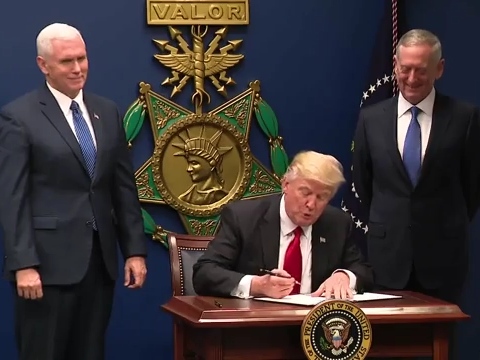The first two weeks of the Trump Presidency have been a wild ride. The breakneck pace of executive orders, battles with the media and generally doing exactly as he said he was going to do has delighted Trump’s supporters even as it alarms official Washington and draws hackles from the media.
On the campaign trail, Trump promised simple, populist solutions to complex problems. Many in Washington assumed that when faced with the practicalities of governing, Trump would abandon his more immodest proposals and adopt a more conventional, pragmatic approach. The travel ban demonstrates that Trump and his team have no intention of doing anything of the sort.
A picture is emerging of a White House determined to make good on President Trump’s campaign pledges, critics be damned. Now, the travel ban is testing whether the nativist populism that won Trump the White House can be translated into workable government policy. The results so far are not promising.
The Courts Have a Vote
Developed by President Trump’s political advisors behind the backs of his national security team, the travel ban executive order was ill-conceived and poorly executed. It left hundreds stranded at airports, sparked protests across the country and unleashed a rash of legal challenges that promise a bruising legal battle in the weeks to come.
The language of the Executive Order is shoddily drafted and riddled with legal holes big enough for the ACLU to drive a truck through. As Benjamin Wittes observed on the Lawfare Blog, “This order reads to me, frankly, as though it was not reviewed by competent counsel at all.” The flaw in this approach is already becoming apparent.
On Saturday, the State Department ordered staff to resume processing visas from banned countries after a Federal Judge in Seattle issued a temporary restraining order.
“We have reversed the provisional revocation of visas,” a State Department spokesman told the Washington Post. “Those individuals with visas that were not physically canceled may now travel if the visa is otherwise valid.”
To Trump’s fans, the rapid-fire activity of his first weeks in office is evidence that a new day has arrived in Washington. Some bumps in the road are to be expected. But, it is also beginning to give an idea of how Donald Trump will govern that is not reassuring.
Politics Versus National Security
The White House contends that a broad ban on travel from seven predominately Muslim countries is necessary to protect the homeland from terrorism. Almost no one in the national security community agrees.
Former CIA Director Michael Hayden told the Washington Post that the order “inarguably has made us less safe. It has taken draconian measures against a threat that was hyped. The byproduct is it feeds the Islamic militant narrative and makes it harder for our allies to side with us.”
“This kind of thing is causing us great damage right now, and it’s sending shock waves through the international system.” – James Mattis
He’s hardly alone. Some now within Trump’s own administration previously said similar things. In July, Trump’s Secretary of Defense James Mattis warned against campaign trail talk of banning Muslims. “This kind of thing is causing us great damage right now, and it’s sending shock waves through the international system.” While the order does not specifically ban muslims, Secretary Mattis, according to aides, remains strongly opposed.
Since 9/11, Presidents of both parties have been forced to make tough decisions about measures required to keep Americans safe. To President Trump and his supporters, the travel ban should be viewed through this same lens.
There is legitimate concern, for example, about sufficient vetting for Syrian refugees given the state of chaos in that country. If the ban was limited to a temporary halt on refugee admissions from Syria, it might be more defensible. But, banning all travel from seven majority Muslim countries is a draconian step to be taking on a hunch.
In the post 9/11 era, the balance of liberty and security has at times tilted towards security: enhanced screening at airports, tighter-restrictions on visas for travelers from certain countries, and expanded intelligence gathering. Most of these measures have drawn some degree of controversy.
Past Presidents took these actions reluctantly, after weighing the implications and circulating drafts among government agencies to smooth out rough edges and avoid unintended consequences. Yet, the travel ban was announced not with reluctance, but glee, underscoring its fundamentally political nature.
Politics Versus Reality
The travel ban is demonstrating the dangers of applying populist politics to sensitive national security issues. The haste with which it was developed and the dubious connection to national security has put the order on legally tenuous ground.
Last week, a White House aide described the order as a “massive success.” The comment has been widely mocked, but it all depends on what success means. Seen in terms of national security, process of government and rule of law, Trump’s travel ban indisputably is not a success at all. Yet, Trump’s supporters are thrilled. In terms of the politics of his base, it is indeed a “massive success.”
And here lies the challenge for the man now holding the reins of the federal government. Trump’s populist message depends on the premise that adversaries, muslim terrorists, illegal immigrants and Washington elites are the source of the country’s problems. While there are kernels of truth in each, solutions are not as simple as banning immigrants from muslim countries, building a wall, and putting an outsider in the White House. Ultimately, a Presidency is judged by results, not rhetoric.
President Trump is in a position any President would envy. With his party in control of Congress, a steadfastly loyal political base, and a country that mostly wants him to succeed, Trump has the potential to be a consequential President. But, at some point, he will have to decide what success means. Is it actually making America great, or just doing a lot of stuff and claiming he has done so?

